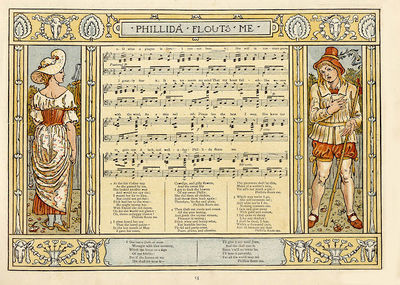Annotation:Phillida Flouts Me: Difference between revisions
No edit summary |
m Text replacement - "garamond, serif" to "sans-serif" |
||
| (5 intermediate revisions by one other user not shown) | |||
| Line 1: | Line 1: | ||
=='''Back to [[{{BASEPAGENAME}}]]'''== | =='''Back to [[{{BASEPAGENAME}}]]'''== | ||
---- | ---- | ||
<p><font face=" | <p><font face="sans-serif" size="4"> | ||
'''PHILLIDA FLOUTS ME.''' English, Air (3/8 time). B Flat Major. Standard tuning (fiddle). AABBC. The 16th century ballad "Phillida flouts me; or, The Country Lovers Complaint" appears in printed broadside sheets (it is in the Roxburghe collection) | '''PHILLIDA FLOUTS ME.''' AKA - "Phillida." English, Air (3/8 time). B Flat Major. Standard tuning (fiddle). AABBC. The 16th century ballad "Phillida flouts me; or, The Country Lovers Complaint" appears in printed broadside sheets (it is in the Roxburghe collection) and in John Watts' '''Musical Miscellany vol. 2''' (1729). The air was the melody for songs in '''The Quaker's Opera''' (1728), '''Love in a Riddle''' (1729), and '''Damon and Phillida''' (1734). Chappell notes that Walton's '''Angler''' (1653) references the tune when the Milkwoman asks, "What song was it, I pray? Was it 'Come Shepherds, deck your heads', or 'As the noon Dulcina rested', or 'Phillida flouts me'?" The tune was also called "Love one another," derived from a song called "The Protestant Exhortation," published by John Playford in 1680, though in a "ruder and therefore probably earlier version of the one given" (in his '''Popular Music of the Olden Times, vol 2'''). [[File:Phillida.jpg|400px|thumb|right|An illustration by English artist Walter Crane (1845-1915) for the songbook '''Pan Pipes''' [http://poulwebb.blogspot.com/2013/09/walter-crane-part-7.html] (1883)]] | ||
<blockquote> | <blockquote> | ||
''O what a plague is love! I cannot bear it,''<br> | ''O what a plague is love! I cannot bear it,''<br> | ||
| Line 13: | Line 13: | ||
<br> | <br> | ||
</font></p> | </font></p> | ||
<p><font face=" | <p><font face="sans-serif" size="4"> | ||
''Source for notated version'': | ''Source for notated version'': | ||
<br> | <br> | ||
<br> | <br> | ||
</font></p> | </font></p> | ||
<p><font face=" | <p><font face="sans-serif" size="4"> | ||
''Printed sources'': Chappell ('''Popular Music of the Olden Times, vol. 2'''), 1859; p. 133. | ''Printed sources'': Chappell ('''Popular Music of the Olden Times, vol. 2'''), 1859; p. 133. Doyle ('''Plain Brown Tune Book'''), 1997; p. 33. | ||
<br> | <br> | ||
<br> | <br> | ||
</font></p> | </font></p> | ||
<p><font face=" | <p><font face="sans-serif" size="4"> | ||
''Recorded sources'': <font color=teal></font> | ''Recorded sources'': <font color=teal></font> | ||
<br> | <br> | ||
<br> | <br> | ||
</font></p> | </font></p> | ||
<p><font face=" | <p><font face="sans-serif" size="4"> | ||
See also listing at:<br> | See also listing at:<br> | ||
Hear a | Hear a 1928 recording of the ballad sung by English tenor John Coates on youtube.com [https://www.youtube.com/watch?v=kQKjeSj4m2g] and at the Internet Archive [https://archive.org/details/JohnCoates-PhillidaFloutsMe1928]<br> | ||
</font></p> | </font></p> | ||
<br> | <br> | ||
Latest revision as of 15:34, 6 May 2019
Back to Phillida Flouts Me
PHILLIDA FLOUTS ME. AKA - "Phillida." English, Air (3/8 time). B Flat Major. Standard tuning (fiddle). AABBC. The 16th century ballad "Phillida flouts me; or, The Country Lovers Complaint" appears in printed broadside sheets (it is in the Roxburghe collection) and in John Watts' Musical Miscellany vol. 2 (1729). The air was the melody for songs in The Quaker's Opera (1728), Love in a Riddle (1729), and Damon and Phillida (1734). Chappell notes that Walton's Angler (1653) references the tune when the Milkwoman asks, "What song was it, I pray? Was it 'Come Shepherds, deck your heads', or 'As the noon Dulcina rested', or 'Phillida flouts me'?" The tune was also called "Love one another," derived from a song called "The Protestant Exhortation," published by John Playford in 1680, though in a "ruder and therefore probably earlier version of the one given" (in his Popular Music of the Olden Times, vol 2).

O what a plague is love! I cannot bear it,
She will inconstant prove, I greatly fear it.
It so torments my mind, That my heart faileth,
She wavers with the wind, As a ship saileth.
Please her the best I may, She loves still to gainsay,
A-lack, and well aday! Phillida flouts me.
Source for notated version:
Printed sources: Chappell (Popular Music of the Olden Times, vol. 2), 1859; p. 133. Doyle (Plain Brown Tune Book), 1997; p. 33.
Recorded sources:
See also listing at:
Hear a 1928 recording of the ballad sung by English tenor John Coates on youtube.com [2] and at the Internet Archive [3]
